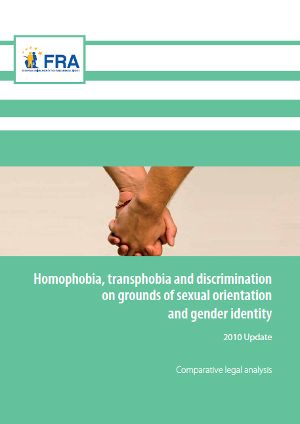Homophobia, transphobia and discrimination on grounds of sexual orientation and gender identity
This report updates the FRA comparative legal analysis of discrimination on the basis of sexual orientation and gender identity first published in June 2008. It presents the situation as it stood at the end of 2009, though information gathered in 2010 has been incorporated to the greatest possible extent. Five main trends among EU Member States can be noted from the information presented in this report.
This report answers a European Parliament request to examine the situation of lesbian, gay, bisexual and transgender (LGBT) persons in depth, following restrictive legislation on their rights in certain EU Member States.
FRA Director Morten Kjaerum: "Our research identified positive developments as well as areas where either little has changed since our last study in 2008, or has changed for the worse. For instance, an increased number of EU Member States recognise the right to marriage to same-sex couples to marry while others do not recognise this right. This, in turn, has legal and practical implications for citizens wanting to move between EU countries. Negative attitudes and stereotyping appear as common roots for inaction or negative developments observed in a number of Member States in our report".
The main findings of this update are summarised below.
First, a few EU Member States have amended their legislation and practice concerning access to gender reassignment treatment, and alteration of the recorded name or sex on official documents for those who have undergone or intend to undergo gender reassignment.
Second, the update reveals progress in a number of Member States in relation to the scope of legal protection against sexual orientation discrimination.
Third, the update reveals progress in relation to the enjoyment of freedom of assembly, and expression for lesbian, gay, bisexual and transgender (LGBT) people as well as protection from violence motivated by prejudice, incitement to hatred and expressions of prejudice and discrimination against LGBT people. For instance, in Poland, Romania and Bulgaria pride marches were held successfully for the first time. In contrast, in Lithuania the 2010 Baltic pride was threatened with cancellation at short notice, and in Latvia the right to organise marches continues to be challenged by elected offi cials despite several court rulings annulling attempted bans.
Fourth, the meaning of the term ‘family member' in the context of the law on free movement, family reunification, and asylum, while often remaining vague, has been or will be expanded in Austria, France, Hungary, Ireland, Luxembourg, Portugal, and Spain to include same-sex couples to differing degrees and in different areas. On the other hand, Bulgaria, Estonia and Romania have consolidated or amended their legislation to specify that marriage is reserved for different-sex couples only, and to deny recognition of same-sex partnerships and marriages concluded abroad. The general situation, thus, signals the persistence of an uneven landscape with respect to freedom of movement and family reunification for same-sex couples.
Fifth, concerning the grant of international protection to LGBT people who are victims of persecution in their countries of origin, the 2008 report found that the inclusion of sexual orientation as a ground of persecution had remained implicit in the legislation of eight Member States. This update shows that the total number of Member States which explicitly consider lesbian, gay and bisexual (LGB) people as a ‘particular social group' has now risen to 21, which signals a clear trend towards legislative inclusion of LGB people as potential victims of persecution. The situation concerning gender identity remains, however, very unclear. Furthermore, this update examines the use of 'phallometric testing' in the Czech Republic to establish the credibility of asylum claims based on sexual orientation. Read more about the 'phallometric testing' here.
Sixth, concerning the ban on the ‘promotion' of homosexuality and same-sex relations to minors or in public, this update finds that Lithuania constitutes the only recent example of such legislation. In contrast, a number of Member States have taken action to foster education and dialogue, with the aim of challenging negative attitudes towards homosexuality and LGBT people, namely Estonia, France, Germany, the Netherlands, Spain and the UK

